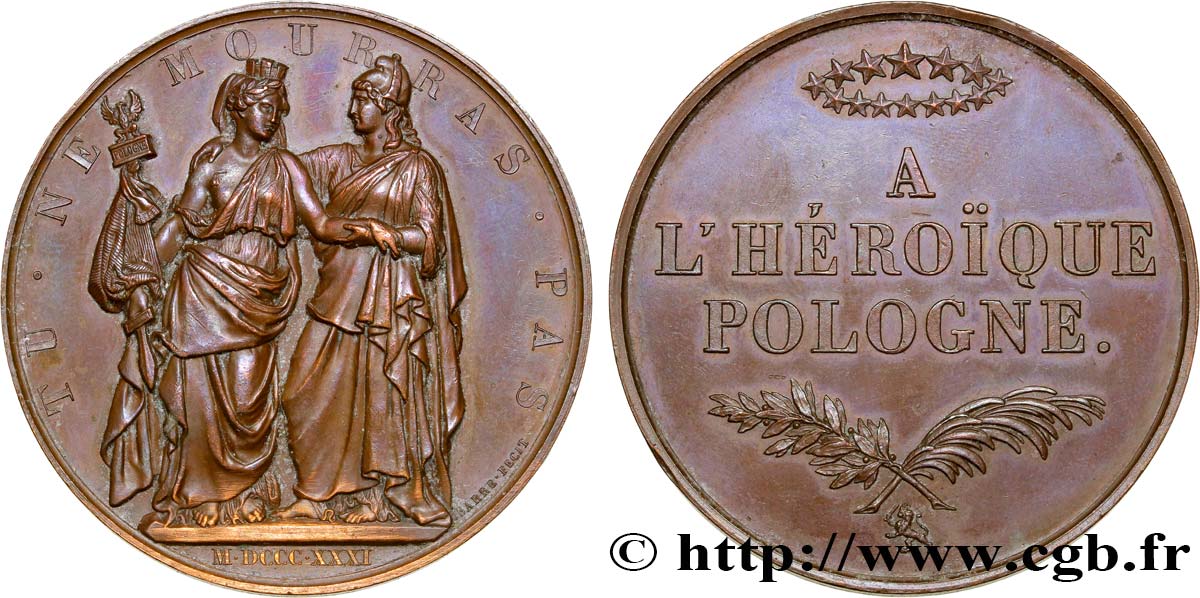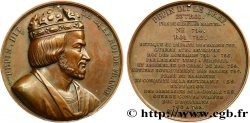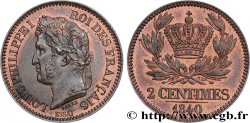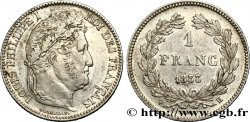fme_371539 - LOUIS-PHILIPPE I Médaille à l’Héroïque Pologne
Not available.
Item sold on our e-shop (2017)
Price : 140.00 €
Item sold on our e-shop (2017)
Price : 140.00 €
Type : Médaille à l’Héroïque Pologne
Date: 1831
Mint name / Town : France, Pologne
Metal : bronze
Diameter : 51 mm
Orientation dies : 12 h.
Engraver BARRE. FECIT
Weight : 61,5 g.
Edge : lisse
Coments on the condition:
Belle médaille avec une agréable patine brune
Obverse
Obverse legend : TU. NE. MOURRAS. PAS.
Obverse description : La France en train de soutenir la Pologne appuyée sur un étendard.
Reverse
Reverse legend : A / L’HÉROÏQUE / POLOGNE..
Reverse description : Légende en trois lignes entre une couronne de 14 étoiles et deux branches posées en sautoir ; un petit lion armé à six heures.
Commentary
La Monarchie de Juillet a connu un mouvement aujourd'hui appelé la « Grande Emigration » polonaise. Celle-ci désigne l'émigration des élites politiques de Pologne entre 1831 et 1870. Cette émigration survint après l'insurrection de Novembre (1830) contre l'Empire russe qui a poussé environ 7 000 Polonais à s'exiler.
Les émigrés étaient issus majoritairement de la petite et de la moyenne noblesse. Les plus glorieux représentants de la cause polonaise comme l'écrivain Adam Mickiewicz ou encore le compositeur Fryderyk Franciszek Chopin purent ainsi s'exprimer dans un pays la France, perçue comme la patrie de la liberté. Les émigrés polonais firent de Paris leur seconde capitale et reconstituèrent leurs institutions religieuses, politiques et culturelles.
En 1832, le prince Adam Czartoryski et le comte Alexandre Walewski fondent la Société Historique et Littéraire Polonaise et la Bibliothèque Polonaise de Paris dont l'objectif était de lutter à travers la collecte de documents ayant trait à l'histoire et à la culture polonaise contre la germanisation et la russification de la Pologne.
Si globalement, les émigrés polonais appartenant à l’aristocratie et à l’intelligentsia furent bien accueillis, Louis Philippe s'inquiétait de la forte présence polonaise et les réfugiés furent placés sous surveillance policière. Dans les années 1840-1850, Napoléon III souhaitera éloigner de France les émigrés les plus “agités”..
Les émigrés étaient issus majoritairement de la petite et de la moyenne noblesse. Les plus glorieux représentants de la cause polonaise comme l'écrivain Adam Mickiewicz ou encore le compositeur Fryderyk Franciszek Chopin purent ainsi s'exprimer dans un pays la France, perçue comme la patrie de la liberté. Les émigrés polonais firent de Paris leur seconde capitale et reconstituèrent leurs institutions religieuses, politiques et culturelles.
En 1832, le prince Adam Czartoryski et le comte Alexandre Walewski fondent la Société Historique et Littéraire Polonaise et la Bibliothèque Polonaise de Paris dont l'objectif était de lutter à travers la collecte de documents ayant trait à l'histoire et à la culture polonaise contre la germanisation et la russification de la Pologne.
Si globalement, les émigrés polonais appartenant à l’aristocratie et à l’intelligentsia furent bien accueillis, Louis Philippe s'inquiétait de la forte présence polonaise et les réfugiés furent placés sous surveillance policière. Dans les années 1840-1850, Napoléon III souhaitera éloigner de France les émigrés les plus “agités”..








 Report a mistake
Report a mistake Print the page
Print the page Share my selection
Share my selection Ask a question
Ask a question Consign / sell
Consign / sell
 Full data
Full data



